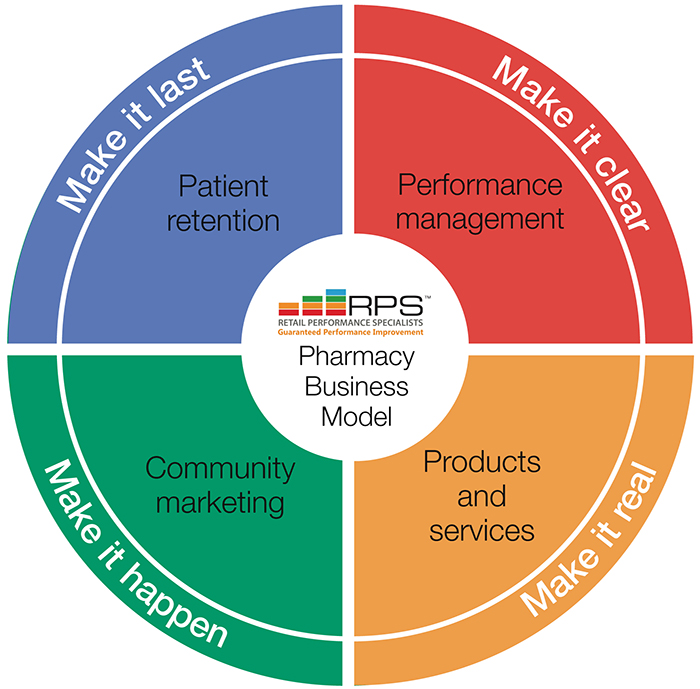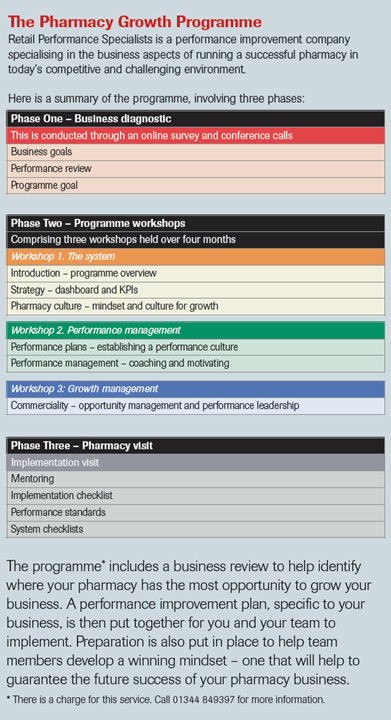Engage your team to grow €“ one more thing
In Running Your Business
Follow this topic
Bookmark
Record learning outcomes
Making changes in your pharmacy business can be achieved step by step, and getting the whole team involved in making small changes can add up to positive results

Business guru Peter Drucker said: €Management is doing things right; leadership is doing the right things.€ How many times have we heard managers and owners say, €If only they did what I asked?€ or €Why can't they all do as well as€¦?€
It's an often used cliché in business that staff are your most important asset, so while you may be busy trying to save money by getting the best deals from wholesalers, providing excellent pharmacy services and customer service, are you putting as much energy into making the most of the skills and potential of your pharmacy team?
Dennis Reid, chairman of Retail Performance Specialists (RPS), believes that maximising the potential of your staff is critical to commercial success, but it needs some careful planning. €You cannot motivate anyone unless you have a gun, but you can provide a performance environment where everyone can succeed,€ he says.
All change
Changes in the community pharmacy landscape are inevitable as a result of the 6 per cent funding cuts announced by NHS England in December last year. The government has clearly asserted its intentions for community pharmacy and this has confirmed unequivocally that staying the same is no longer an option €“ the pharmacy business model is changing, whether we like it or not. This means that pharmacy teams may need to rethink their business strategy.
Whatever your future holds as a result of the cuts, your pharmacy is a business and your team may have to be reminded of that fact. It's important that everyone working in the team is aware of the possible implications and that they have a commercial, as well as a clinical mindset, and are focused on providing the services your community needs and wants.
Change is difficult, especially when it is forced upon you, and what you are doing has worked very well for many years. In the scenario currently faced by community pharmacy, the demoralising effect of the cuts, combined with the lack of appreciation and acknowledgement of the contribution pharmacy makes to primary care, will have dampened enthusiasm for change.
Nevertheless, change is coming, and RPS believes a good way to manage that change is to create an environment in your pharmacy where change is simpler, using small steps and where performance improvements can be seen easily. The company says that engaging your pharmacy team through the principle of €one more thing€ is the way to do this.
The way this works, is that you encourage each person in your team to do one more thing this week that will improve the patient experience and the businesses top and bottom line. For example, one person could focus on increasing the number of MURs. In Leicestershire alone, 73 per cent of pharmacies do not achieve their MUR allowance, so there may be plenty of scope for improvement.
Another suggestion is promoting retail offers, such as shampoo and plasters, to customers in your pharmacy already, who usually purchase them from somewhere else. Do you have added-value services that can be promoted: smoking cessation, diabetes services, flu and travel vaccinations? What could your team do better, and who would be best to do it?
While the team focuses on their one more thing, it's the responsibility of the owner/manager to create the right environment where everyone can be successful. According to RPS, its pharmacy growth programme model is a tried and proven formula for success, with both independent and multiple pharmacy groups.
Some examples include an increase in MURs of 500 per cent, minor ailments up by 300 per cent, retail sales increases of 21 per cent and prescription volume increases of 5 per cent. €The programme enables delegates to identify where their opportunities are, but the real skill is in engaging their teams and capturing that opportunity,€ explains Mr Reid.
The four RPS principles, to help create a performance environment and therefore a successful team, are:
- Focus on an objective and target
- Create a simple plan and schedule
- Do things differently (one more thing) €“ through practicing and coaching
- Sign-off, accountability, review and renew.
Objectives and targets
If you give everyone clear objectives and targets, some will get results on their own, some will need support and confidence and others will need to be trained. So, you will need to be prepared to invest time in supporting some team members to achieve their targets. RPS has many examples of MUR delivery increasing from a small number to the maximum within a very short period of time.
One pharmacy that increased MURs by 500 per cent, kept it simple. They:
- Made a list of eligible patients
- Put a note on their scripts
- Agreed a helpful way of introducing the serice to eligible patients
- Offered it to everyone who was eligible.
The outcome was that they reached the maximum number of MURs. All patients were happy with the offer and many were also interested in OTC and other services.
While the payment for this goes straight on the bottom line, the real benefit is much more than that. It's about locking patients into your pharmacy and the services you can offer following each medicine review.
The benefit of having clear objectives and targets is embracing change and looking for opportunity, whether that is more volume, profitable services, retail and OTC contribution or improved productivity and cost reduction. Patients are also customers; they buy all the services and products you offer, just not from you.
Plans and schedules
Change is really hard (try to fold your arms the opposite way, or go home a different route).
This may be because we like what we are doing now, we are nervous of changing or we do not know how to change. The power of one more thing is that change is easier if you take small steps, document them and put a deadline on it. What could each of your pharmacy team do tomorrow that would capture even one more regular patient, sell one more item, offer one more service or save one more hour?
Do things differently
Ask your team, what could we do differently today, to capture the power of €one more thing€? Have each person in your pharmacy commit to the one more thing they will do today, to help to improve performance by one more point, and outline how will they do that.
Create your own initiative to introduce and offer one more review, one more test, one more service and one more product.
Do one more thing
Dennis Reid of Retail Performance Specialists is a retail specialist who helps companies increase sales, performance and profitability. He has more than 35 years' experience and has worked with major companies including Nike, Gucci, Nokia and Marks & Spencer.
He now works with community pharmacies to deliver the Pharmacy Growth Programme, and is so confident in the team's expertise that the company is guaranteeing a 10-fold return on investment over 18 months or your fee returned.
To explore how the Pharmacy Growth Programme could benefit your business, call Andrew Reid on 01344 849397, or email andrew@rps-global.com.
Accountability and sign-off
 Hold your team accountable for what they said they would do: their one more thing. Encourage change, and soon the one more things add up to be a lot more things.
Hold your team accountable for what they said they would do: their one more thing. Encourage change, and soon the one more things add up to be a lot more things.
Sign-off is an oftenneglected area of performance coaching, says Mr Reid. Every agreed action should be checked against the agreed deadline, so you need to have regular discussions about progress (without badgering) and a review should be competed to assess whether the action had the desired result.
It's also important to praise those who do everything they said they would do, even if the plan did not achieve the targeted outcome (it just means you need to come up with a better plan). You will want to consider the following:
- Which parts of the plan worked well?
- Which parts did not achieve what we had hoped?
- What will we do differently are a result?
This becomes the new plan, for which a new target can be set. For example, one independent community pharmacy that RPS worked with increased their MURs but did not sell any additional new services. Their €plan B€ was to offer more services and this resulted in further improved performance.
The drive to thrive
If you need to change to survive or to thrive (and let's face it, who doesn't?) and would like to get there more quickly with less angst, perhaps you should consider using the Pharmacy Growth Programme (see the box below). The programme will give you the models, guides and templates to set up your Pharmacy Performance System. RPS will help you make the one more thing model happen for your pharmacy business.

